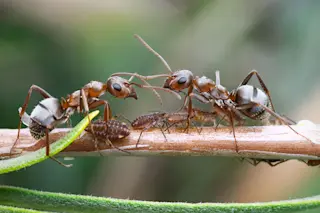They clean themselves before entering their home. They use special chemicals to disinfect. They restrict access to high-traffic areas. And no, they’re not human — they’re ants. Long before social distancing became a household term for us, ants were practicing a version of it to ward off diseases in the nest. And they’re good at it.
Ants are effective at preventing epidemics within their colonies, despite their close living quarters and massive communities. In fact, epidemics and sick colonies are rarely, if ever, found in the wild. Thanks in part to this, ants are one of the most successful species on Earth. According to some estimates, they make up almost a quarter of all terrestrial animal biomass. And because of the social measures they’ve evolved to use, ant behavior often seems distinctly intelligent — but it’s really not.
“You can learn some things from animals, even though it's very different ...














